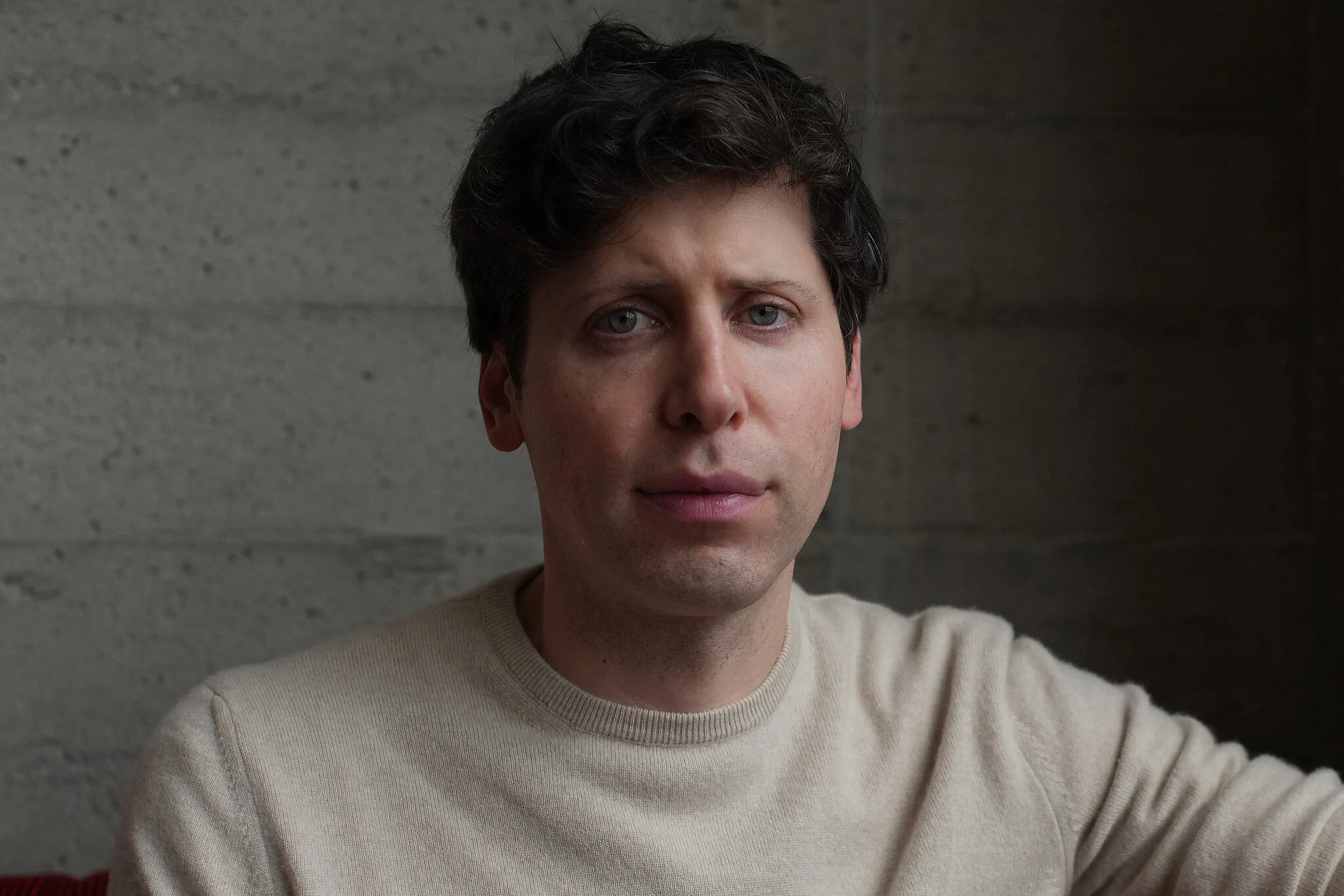Sam Altman
The Visionary Behind OpenAI and the Future of Artificial Intelligence
by Desk Reporter

In the ever-evolving world of technology, few names shine as brightly as Sam Altman’s. Known for his pivotal role as the CEO of OpenAI, Altman has carved a unique space for himself as a thought leader, innovator, and entrepreneur. His vision transcends mere technological advancements; it reflects a deep-rooted belief in harnessing artificial intelligence (AI) for the greater good of humanity. To truly understand his impact, we must delve into his cultural background, the journey that led him to OpenAI, and the monumental successes that followed.
Early Life and Cultural Roots
Samuel H. Altman was born on April 22, 1985, in St. Louis, Missouri, USA. Raised in a middle-class Jewish family, Altman’s upbringing emphasized the importance of education, curiosity, and innovation. His family instilled in him a strong sense of purpose and the value of hard work. From an early age, Altman exhibited a keen interest in computers and programming. By the time he was 8 years old, he was already experimenting with coding, a passion that would later shape his career.
Altman’s cultural background played a significant role in shaping his worldview. The Jewish tradition of questioning, learning, and ethical responsibility influenced his approach to technology and leadership. These values resonated deeply in his later work, particularly his belief in using AI responsibly and inclusively.
Educational Journey and Early Ventures
Altman attended John Burroughs School, a private high school in St. Louis, where his intellectual curiosity flourished. He later enrolled at Stanford University to study computer science but dropped out after two years to pursue entrepreneurial ventures. This decision marked the beginning of a career that would disrupt industries and redefine possibilities.
In 2005, Altman co-founded Loopt, a location-based social networking app. Loopt was ahead of its time, offering users the ability to share their real-time location with friends—a precursor to today’s popular geolocation services. Although Loopt didn’t achieve massive commercial success, its acquisition by Green Dot Corporation in 2012 provided Altman with invaluable experience and resources to embark on larger projects.
The Y Combinator Era
Altman’s entrepreneurial spirit caught the attention of Y Combinator (YC), the famed startup accelerator. In 2011, he joined YC as a part-time partner, eventually becoming its president in 2014. Under his leadership, Y Combinator flourished, funding some of the most successful startups of the decade, including Airbnb, Dropbox, Stripe, and Reddit. Altman’s vision for YC extended beyond financial success; he sought to build a community of founders driven by a sense of purpose. He introduced initiatives like the YC Continuity Fund and the YC Fellowship, ensuring startups had support at every stage of their journey. His tenure at YC solidified his reputation as a mentor and visionary leader in the tech industry.

The Birth of OpenAI
In 2015, Altman co-founded OpenAI with Elon Musk, Greg Brockman, Wojciech Zaremba, Ilya Sutskever, and others. OpenAI was born out of a shared concern: the rapid pace of AI development posed both immense opportunities and significant risks. Altman and his team envisioned an organization dedicated to ensuring that AI benefits humanity as a whole rather than serving narrow interests.
OpenAI’s mission was ambitious: to create artificial general intelligence (AGI) that is safe and equitable. Unlike many tech organizations driven purely by profit, OpenAI began as a non-profit research lab, emphasizing transparency, collaboration, and ethics. Altman’s leadership emphasized the idea of “AI for all,” striving to democratize access to cutting-edge AI technologies.
The Success Story of OpenAI
Under Altman’s guidance, OpenAI quickly became a global leader in AI research and applications. The development of GPT models, including GPT-3 and ChatGPT, showcased the organization’s prowess in natural language processing. These models revolutionized industries, offering advanced tools for writing, coding, customer service, and more.
The launch of ChatGPT, in particular, was a watershed moment. By making AI conversational, accessible, and user-friendly, OpenAI demonstrated the potential of AI to empower individuals and businesses alike. Millions of users adopted ChatGPT within weeks of its release, cementing its status as one of the most impactful AI applications of the decade.
Altman’s ability to balance technological innovation with ethical considerations has been instrumental in OpenAI’s success. He spearheaded efforts to address challenges like algorithmic bias, data privacy, and misinformation. In 2019, OpenAI transitioned to a “capped-profit” model, allowing it to attract investment while staying true to its mission.
Vision and Philosophy
Sam Altman’s vision for OpenAI reflects his broader philosophy about technology and society. He believes that AI has the potential to solve some of humanity’s most pressing problems, from climate change to healthcare. However, he also recognizes the risks, particularly the concentration of power in the hands of a few.
Altman advocates for collaborative regulation of AI, urging governments, tech companies, and civil society to work together. His call for a balanced approach is rooted in the belief that innovation and safety are not mutually exclusive. By fostering open dialogue and international cooperation, he hopes to create a future where AI serves as a force for good.
Challenges and Criticisms
Altman’s journey has not been without challenges. The rapid pace of AI development has raised ethical and societal concerns, from job displacement to potential misuse of technology. Critics have questioned OpenAI’s transition to a capped-profit model, arguing that it may compromise the organization’s original mission.
Despite these challenges, Altman remains steadfast in his commitment to ethical AI. He has called for greater transparency and accountability in AI research, acknowledging the need for constant vigilance and adaptability in a rapidly changing landscape.
Legacy and Impact
Sam Altman’s influence extends far beyond OpenAI. As a thought leader, he has inspired a new generation of entrepreneurs and innovators. His essays on technology, economics, and the future of humanity are widely read, offering insights into the intersection of philosophy and engineering.
Altman’s legacy lies in his ability to combine technical expertise with ethical foresight. His work with OpenAI has set a benchmark for responsible innovation, challenging the tech industry to prioritize societal well-being over short-term gains.
Looking Ahead
As AI continues to evolve, Altman remains at the forefront of the conversation. His focus on AGI reflects a belief that humanity is on the cusp of a transformative era. However, he emphasizes the importance of humility and caution, recognizing that the journey toward AGI is fraught with unknowns.
Altman envisions a future where AI enhances human creativity, improves global productivity, and addresses systemic inequalities. Through initiatives like OpenAI’s partnership with organizations worldwide, he seeks to ensure that this future is inclusive and equitable.
Conclusion
Sam Altman’s story is one of relentless curiosity, bold vision, and unwavering commitment to the greater good. From his humble beginnings in St. Louis to leading OpenAI, Altman has demonstrated that technology can be a force for positive change when guided by ethical principles.
As we stand at the crossroads of the AI revolution, Altman’s work serves as a reminder of the power of innovation to shape a better future. His journey is far from over, but one thing is clear: Sam Altman is not just building technologies—he is building a legacy.


